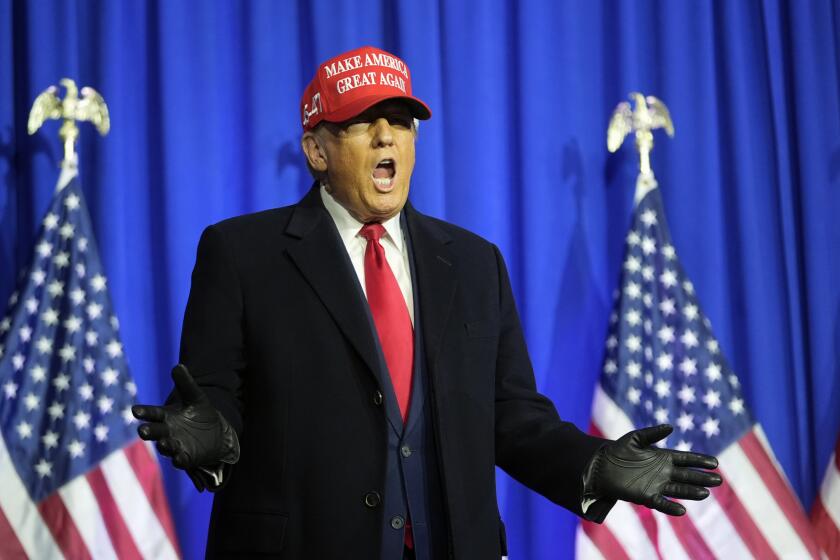Column: Harris is auditioning to be commander-in-chief. Trump wants to be disrupter-in-chief

- Harris argues that the United States must lead strong international coalitions to contain autocrats like Russian President Vladimir Putin and Chinese leader Xi Jinping.
- Trump, meanwhile, has long expressed admiration for repressive autocrats, including Putin (“very strong control”) and Xi (“an iron fist”).
Presidential elections rarely hinge on questions of foreign policy, except when the United States is in a shooting war. Voters are more likely to make their choices based on how they feel about the economy, or abortion, or other domestic issues.
But foreign policy still has a way of barging into a campaign, especially when global events remind voters that the world is a dangerous place.
It has happened this year, as Israel’s war against Hamas in Gaza mushroomed into a regional conflict, including an Iranian missile attack against Israel.
Vice President Kamala Harris abandoned her campaign schedule for a day to monitor the attack from the White House situation room, and seized the chance to sound like a commander-in-chief in waiting.
“I am clear-eyed,” she said. “Iran is a destabilizing, dangerous force in the Middle East, and today’s attack on Israel only further demonstrates that fact. … My commitment to the security of Israel is unwavering.”
Former President Trump reacted by renewing his charge that the war in Gaza was a product of President Biden’s failures, and claimed — without offering evidence — that it would never have started if he were president.
“The whole world is blowing up,” he said at a rally in Michigan last week. “We have incompetent people, and she’s more incompetent than Biden.”
Where do Kamala Harris and Donald Trump stand on foreign policy areas such as Mexico, NATO, Ukraine, Israel-Hamas and the Gaza war, China, the Koreas?
Then he added this falsehood: “You know, I had no conflict. I had no wars.”
During Trump’s presidency, U.S. troops fought wars in Afghanistan, Iraq and Syria, and at least 65 died in combat. (He would be on firmer ground if he said he started no new wars, but that wouldn’t serve his purpose; Biden hasn’t started any new wars either.)
The point of their dueling statements wasn’t to debate the nuances of U.S. policy in the Middle East — although they do have differences. (Harris has advocated a cease-fire in Gaza; Trump urged Israel to “finish the job.”) It was to restate their claims to be the best choice as commander-in-chief.
On that count, voters face a choice that extends far beyond the Middle East — not on the details of diplomacy, but on basic principles of American foreign policy. The candidates approach the world with divergent premises.
The vice president has learned a lot from her boss but brings her own well-stocked quiver of global ideas.
Harris has placed herself squarely in the tradition of recent Democratic administrations, especially Biden’s, arguing that the United States must lead strong international coalitions to contain autocrats such as Russian President Vladimir Putin and Chinese leader Xi Jinping.
“In the enduring struggle between democracy and tyranny, I know ... where the United States belongs,” she said at the Democratic National Convention.
Trump, meanwhile, has long expressed admiration for repressive autocrats, including Putin (“very strong control”), Xi (“an iron fist”), North Korea’s Kim Jong Un and Turkey’s Recep Tayyip Erdogan.
“He views himself as a big guy,” John Bolton, who served as national security advisor under Trump, told CNN this year. “Big guys like Erdogan in Turkey get to put people in jail and you don’t have to ask anybody’s permission. He kind of likes that.”
Trump and his allies have continued to court foreign autocrats, including several who would likely not get such treatment in a Democratic White House.
But foreign leaders found Trump susceptible to manipulation, former Trump aides have said. “They know that flattery works with him,” Bolton said.
Trump has denounced traditional U.S. alliances in Europe and Asia as scams by which devious foreigners have tricked gullible Americans into one-sided military and trade deals.
In his first term, he repeatedly threatened to withdraw the nation from the North Atlantic Treaty Organization, the 32-country military alliance that has been a cornerstone of U.S. security for 75 years. Bolton says he expects Trump to try to pull out of the alliance if he wins a second term.
In Europe, there’s relief over a strong standard-bearer facing Trump. A Kamala Harris win would represent continuity, with some potential curveballs.
The result, traditional foreign policy scholars say, would be a less stable world, leaving smaller countries vulnerable to powers such as Russia and China.
“If other countries can no longer rely on American security guarantees, everybody else is going to take matters into their own hands,” said Fiona Hill, a former advisor to Trump. “They’ll go out and arm themselves. Countries that don’t have nuclear weapons will consider building their own. … On some issues, the United States could even be marginalized — especially if you have an administration that isn’t good at building partnerships.”
The clearest case in point is Ukraine, locked in a grueling war against Russia, which invaded in 2022.
Trump’s running mate, J.D. Vance, once said: ‘I don’t really care what happens to Ukraine one way or the other.’
Harris, like Biden, has pledged to continue military and economic aid to the government of President Volodymyr Zelensky until it can negotiate from a position of strength.
“Putin’s agenda is not just about Ukraine,” she warned, suggesting that the Russian leader would threaten other countries if he won.
Trump, by contrast, argues that Ukraine has effectively lost the war already.
“It’s demolished,” he said before meeting with Zelensky last month. “The people are dead. The country is in rubble.”
As president, he said, he would negotiate a truce “in one day.” “That deal would be easy,” he said.
Trump wants the right to fire civil servants he sees as disloyal: Cue IRS audits for Trump enemies, anti-vaxxers in the FDA, revenge prosecutions.
His running mate, Ohio Sen. JD Vance, has been more precise, suggesting Russia could keep the Ukrainian territory it has seized and Ukraine would be barred from joining NATO.
Harris denounced that idea: “These proposals are the same of those of Putin. They are proposals for surrender.”
Ukraine isn’t the only beleaguered country Trump might cut adrift. Asked last year whether he would help defend Taiwan against a potential Chinese invasion, he ducked the question — and complained that Taiwan “took all of our [semiconductor] business.”
Trump has also promised to touch off trade wars by imposing tariffs as high as 20% on every other country in the world, plus 60% on China — another step that would strain traditional alliances and sow chaos in the U.S. and global economy.
Tariffs on foreign goods aren’t paid by other countries; they’re paid by American consumers — and they often fail to protect jobs.
In his first term, the former reality television star often proposed that kind of disruptive action, apparently believing it would help him negotiate from a position of strength.
In many cases, top aides drawn from the conservative national security establishment talked him out of the moves. But in a second term, Trump has suggested that he would no longer be constrained by traditionalist cautions — he would staff his White House with MAGA loyalists, not establishment figures.
Harris would be a more predictable leader — and predictability is a quality foreign governments cherish. Scholars have debated whether her foreign policy would look more like Biden’s, with its embrace of global leadership, or that of President Obama, who sought a more restrained approach that one of his aides described as “leading from behind.”
But those are nuances compared to her differences with Trump. The choice before voters is stark: international leadership built around long-standing alliances, or disruptive unilateralism with a strange fondness for authoritarians.
That question won’t decide the November election. Most voters will make their choices on domestic issues, especially the economy. Even in swing-state Michigan, home to the nation’s largest Arab American community, only 1% of Democratic voters say they consider U.S. policy in the Middle East the most important issue, according to a New York Times/Siena College poll last month.
But even if those international issues aren’t at the top of voters’ minds, they still deserve a share of their attention.
In travels around the country, Hill, the former Trump aide, has encountered technology executives in North Carolina who need imported minerals to make industrial batteries, and lentil farmers in Idaho who rely on foreign markets to sell their crops.
“We tend to think foreign policy doesn’t matter much,” she said. “But sooner or later, foreign policy will come to find you.”
More to Read
Sign up for Essential California
The most important California stories and recommendations in your inbox every morning.
You may occasionally receive promotional content from the Los Angeles Times.


















